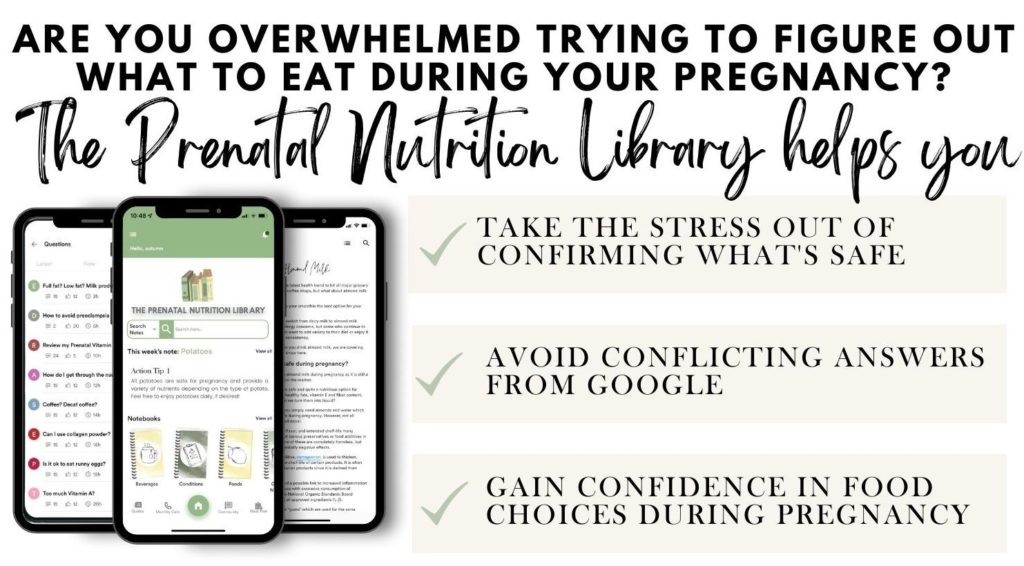Cinnamon is a well-known spice that is used in food and drinks all over the world. It’s used in both sweet and savory recipes to add a delicious punch of flavor. The strong, distinct flavor comes from cinnamon bark that is either dried or ground, then added to taste.
There are several noteworthy health benefits of cinnamon. But what about during pregnancy, when good nutrition is especially important? Is it true that cinnamon could contribute to miscarriage? I’m dedicating this post to answering that very question. Let’s get into it.
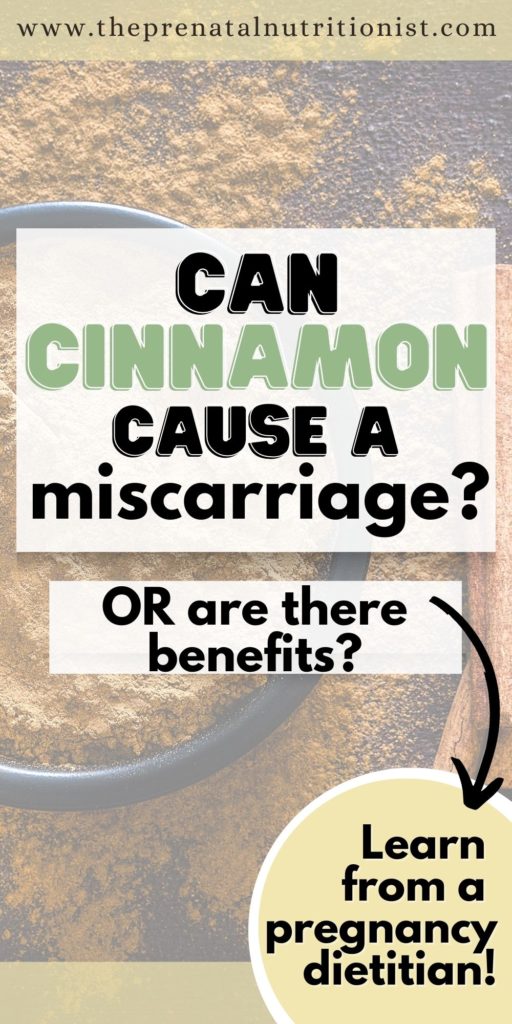
Can Cinnamon Cause A Miscarriage?
You might have heard rumors that consuming cinnamon during pregnancy can either induce labor or cause a miscarriage. However, there is no scientific evidence to support this. Cinnamon is safe for pregnant women when consumed in amounts found in food.
This means, just like with spicy food and miscarriage, the idea that cinnamon can cause a miscarriage is a myth. You don’t have to avoid cinnamon in food amounts to protect your pregnancy.
Too much cinnamon, however, can cause some problems during pregnancy. Large amounts of cinnamon, like cinnamon supplements or the “cinnamon challenge,” should be avoided while you’re expecting. Using cinnamon as a supplement during pregnancy is not recommended because these supplements contain a more concentrated amount of cinnamon than what you’ll find in foods and drinks.

Types of Cinnamon
There are several different types of cinnamon, but most cinnamon and cinnamon products you’ll come across are made of one of the two main types: Ceylon cinnamon and cassia cinnamon.
Ceylon cinnamon, known as “true” cinnamon, is mostly grown in Sri Lanka. It tends to come in rolls that are smaller, denser, and have a more “flaky” texture.
Cassia cinnamon is the most common type of cinnamon sold in the US. It’s grown in Southeast Asia and tends to be thicker rolls of bark.
Ceylon cinnamon is preferred when available. It has lower levels of coumarin. Coumarin can cause liver damage when consumed in large quantities. This is more likely a problem when it’s consumed frequently and over a long period of time. Eating cassia cinnamon in culinary amounts is not generally a problem.
Additionally, because cinnamon essential oil contains such a high concentration of cinnamon, it’s not recommended for use during pregnancy.
Overall, a small amount of cinnamon is beneficial for pregnancy because of its anti-inflammatory, antioxidant, and blood sugar-regulating properties. But as with any food during pregnancy, I suggest consuming it in moderation!
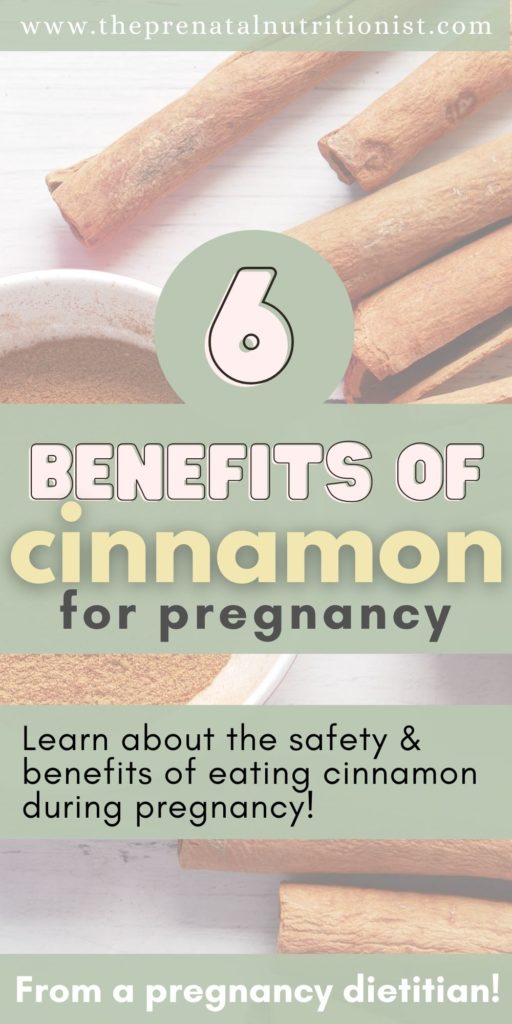
Cinnamon and Pregnancy Benefits
Antioxidants to Support Your Immune System
Cinnamon contains polyphenols, or antioxidants, that can help support your immune system. This is especially beneficial during pregnancy when your immune system is slightly weakened.
Antioxidants help your body fight free radicals. Free radicals are essentially “waste products” that your body naturally produces, but they can damage your cells and lead to inflammation if they’re not eliminated.
Cinnamon has also shown antimicrobial properties that can help to inhibit the growth of listeria and E. coli in food. Foodborne illnesses that are contracted from these types of bacteria can be especially harmful during pregnancy.
*For more immune-support foods and recipes, check out my cookbook!
May Help Regulate Blood Sugar Levels
Including cinnamon in your pregnancy diet can potentially help lower your blood glucose levels. This may be especially helpful if you’ve been diagnosed with gestational diabetes. Cinnamon has been shown to help lower fasting blood sugar levels.
May Help Lower Blood Pressure
Cinnamon may help lower your blood pressure, particularly if you have high blood pressure. Note that there is not enough data to support the use of cinnamon supplementation for high blood pressure, and this study was not done in pregnant individuals.
Supports Heart Health
Cinnamon has active components that can potentially help protect the heart because they have a relaxing effect on blood vessels. It may also support healthy cholesterol levels.
Helps Reduce Inflammation
Cinnamon contains anti-inflammatory properties. These properties can potentially reduce inflammation throughout your body to help relieve your aches and pains and perhaps reduce swelling.
Flavor Enhancement
Cinnamon adds a delightful and aromatic flavor to foods, which can help enhance the taste of healthy dishes. It is great to use to make a dish sweeter without adding sugar. Incorporating cinnamon into meals can make a well-rounded and nutritious pregnancy diet more enjoyable.
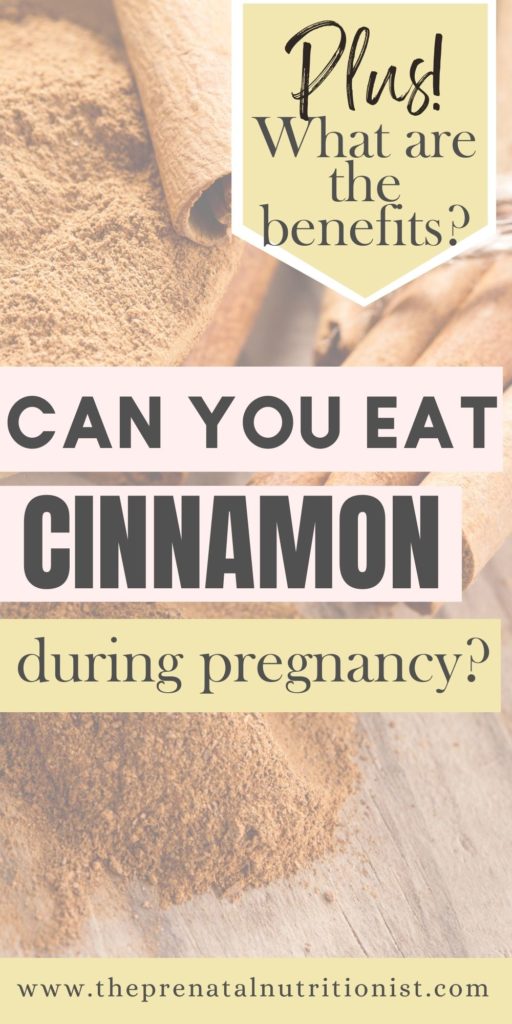
Cinnamon and Pregnancy Side Effects
Heartburn Or Indigestion
Some pregnant women may experience heartburn or reflux after consuming cinnamon. This is because, in some people, cinnamon irritates the lining of the digestive tract. Theoretically, the oil in cinnamon can relax the lower esophageal sphincter (LES), which is responsible for keeping stomach acid in your stomach. Get our heartburn guide for pregnancy for FREE when you download The Prenatal Nutrition Library App.
Cinnamon Supplements
While sprinkling cinnamon on foods or beverages is safe to do, it is best to avoid cinnamon supplements during pregnancy. Supplements have higher concentrated doses of cinnamon. There is limited research on this, and no evidence to support this would have a special benefit for pregnancy. Whenever possible, it’s always best to limit supplements to just the necessary and take a food-first approach.
Is Cinnamon Tea Safe During Pregnancy?
Cinnamon tea is made from dried and rolled sticks of cinnamon. It’s safe for pregnant women to drink and offers the same benefits as cinnamon powder in small amounts.
According to the USDA, consuming about half a teaspoon of cinnamon per day or less is safe and provides a wide range of benefits. Cinnamon tea, in moderation, is a safe way to incorporate this spice.
Additionally, one cup of cinnamon tea provides small amounts of potassium, calcium, and non-heme iron, which are all important for a healthy pregnancy. However, since cinnamon is best consumed in moderation, it’s generally recommended to have cinnamon tea no more than one or two cups a day or a couple of times a week.
**Learn which teas you can enjoy and which you should avoid inside The Prenatal Nutrition Library!
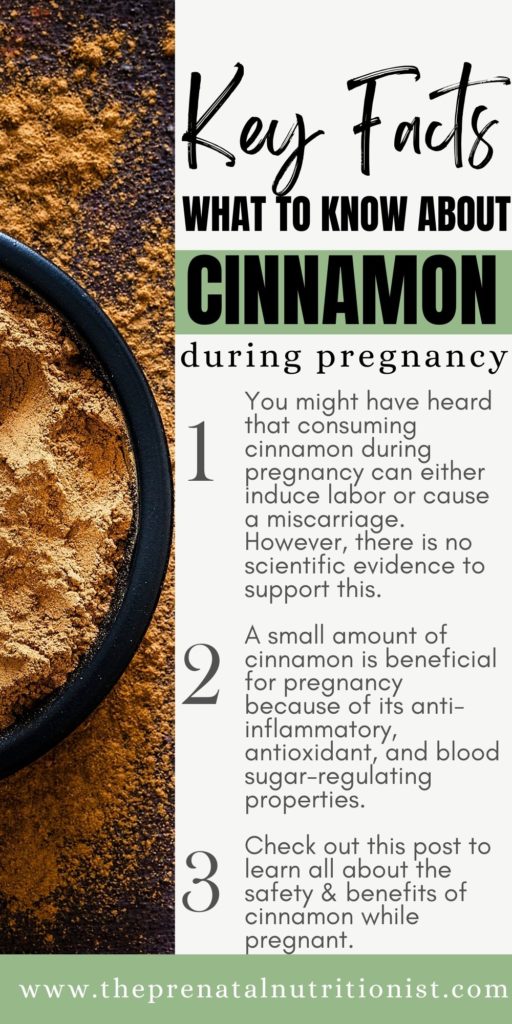
Cinnamon is generally safe to consume during pregnancy and won’t cause a miscarriage.
There are numerous benefits of consuming cinnamon in moderation, especially during pregnancy. However, avoid ingesting large amounts in one sitting. Hint: Avoid the “cinnamon challenge.”
Find more information on nutrition for every stage of your pregnancy journey on the blog.
For access to more valuable pregnancy nutrition information, join The Prenatal Nutrition Library. It’s a searchable database and app where you can search THOUSANDS of topics, foods, and nutrients to get a quick, evidence-based answer. Want a sneak peek first? Download The Prenatal Nutrition Library app on Apple or Android for a look inside and to grab a FREE 1-week meal plan!
